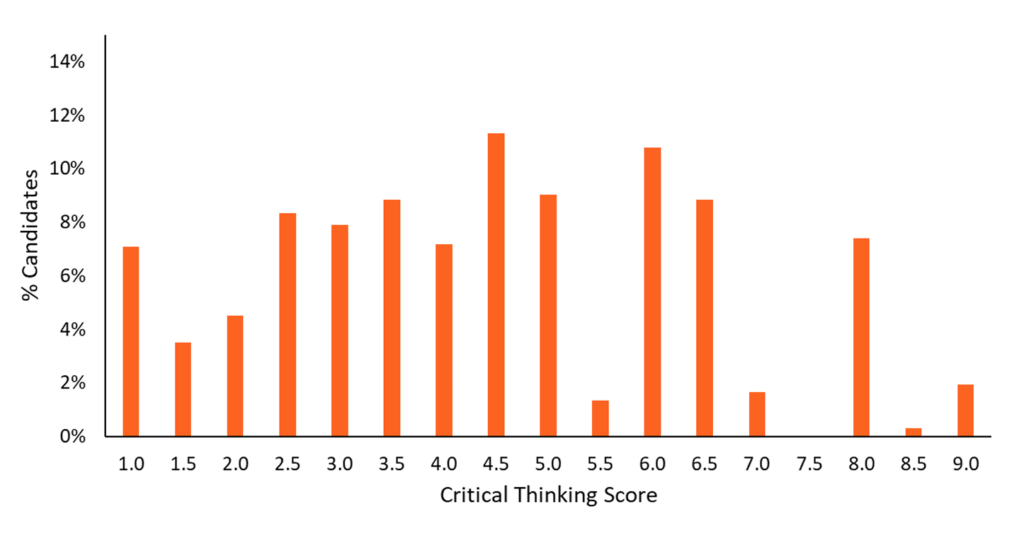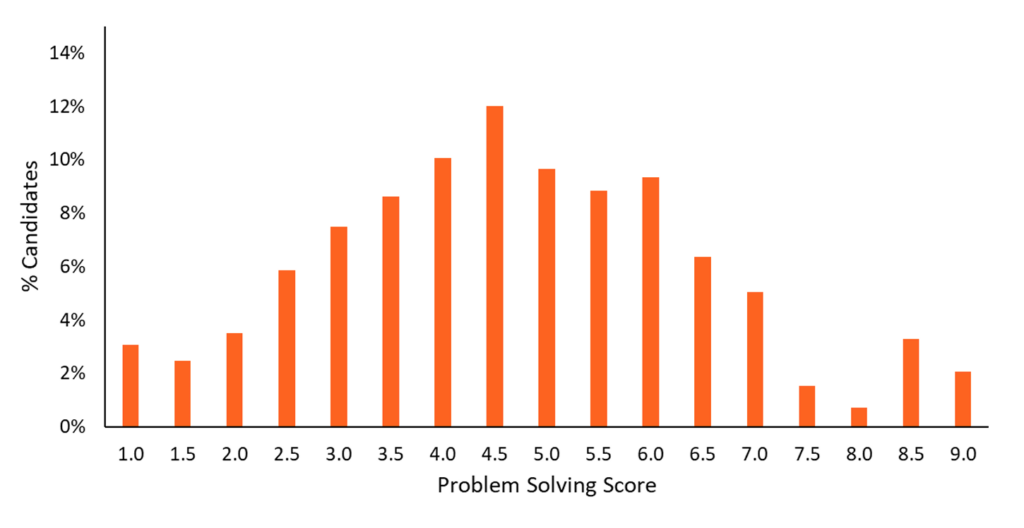TARA Guides
What is a Good TARA Score – TARA 2025 Results
Written by: Nick Morfidis
The TARA (Thinking and Reasoning Assessment) is a general admissions test currently used by the University of Oxford and University College London (UCL) to assess applicants for a range of courses, including Computer Science, Management Science, Political Studies, Robotics, and Social Sciences. If you’re applying to one of these courses at UCL this year, you’ll most likely be required to sit the TARA – and your results will play a significant role in your application.
The TARA assesses your critical thinking, problem solving, and writing skills. That means it doesn’t just test your academic knowledge – it also offers a unique opportunity for self-reflection and intellectual growth beyond the admissions process.
That’s why it’s so important to understand how your TARA results are calculated, what they mean, and how they could impact your application to UCL.
1/3
HOW IS THE TARA SCORED?
The TARA consists of three modules: Critical Thinking, Problem Solving, and a Writing Task. However, you’ll only receive two official scores from UAT-UK – one for Critical Thinking and one for Problem Solving.

The Writing Task isn’t formally scored, but it is sent to any universities you’re applying to that require it, and may be used at their discretion as part of the decision-making process. This means it can still play a role in your application, even though it doesn’t contribute to your final score.
Importantly, TARA is a no-fail test – there’s no pass/fail threshold, and no grade that formally declares you’ve succeeded or failed. Instead, your scores are considered as part of your university application, and each institution will decide how to interpret and weigh them.
Modules 1 and 2 of the TARA test Critical Thinking and Problem Solving skills in a selection of 22 multiple-choice questions, each giving you five answers to choose one from. The total time you have for each module is 40 minutes, which gives you about 1.8 minutes per question. UAT-UK has announced that you don’t lose marks for incorrect answers, so it’s worth trying to answer all questions to the best of your abilities to maximise your score potential.
Unlike other exams, the TARA provides a separate score for each of the two modules, emphasising the test’s focus on assessing specific skills individually. Scores range from 1 to 9, with 1 being the lowest and 9 the highest. Each score is reported to one decimal place (for example, 6.5 or 7.2), which gives a more detailed picture of your performance.
Scores are adjusted to ensure fairness, so results from different versions of the test can be compared on the same scale.
TARA Results October 2025
Below are the score distribution charts for the first-ever sitting in the TARA, which was held in October 2025. Each chart displays the score distributions for one of the two modules (no scores are provided for the writing task):
TARA Critical Thinking Results October 2025

TARA Problem Solving Results October 2025

In all UAT-UK exams, the score distributions generally look like a bell chart, with a fairly smooth hill forming in the middle where the most common scores are. This is the case for Problem Solving, which saw a most common score of 4.5, but the Critical Thinking chart is messier.
The chart here is much flatter, with no clear rise and fall where more applicants achieve a certain score. Instead, a large portion of applicants scored 4.5 and 6.0, while very few scored 5.5, 7.0, 7.5 and 8.5.
Overall, it appears more applicants scored in the bottom half of the scale, indicating that the test was harder than a standard admissions test. This is most evident by the fact that over 7% of applicants score 1.0. Typically, only 2% – 4% of applicants would score in this range for UAT-UK tests (as we can see in the Problem Solving module), so it’s clear that something was different about this module.
As this was the first ever sitting of the test, it is more likely that something may not have been quite right with this module, so the exam creators will likely explore how this happened and how to make the results more stable in future tests.
When Are The TARA Results Released?
Your results will be automatically sent to any participating institutions listed in your UCAS application shortly after your test date. Scores are matched to your application on a course-by-course basis, meaning only universities that require the TARA for the specific course you’re applying to will receive your results – whether the test is compulsory or optional. Candidates cannot choose which institutions see their scores.
You will also be able to see your results approximately four weeks after you sit the test – you will receive a notification on your UAT-UK account once they’re ready.
2/3
WHAT IS A GOOD TARA SCORE?
Each of the two officially marked TARA modules contains 22 multiple-choice questions. So, you might be wondering: how many questions do you need to get right to achieve a “good” score?

We know that the TARA’s Critical Thinking and Problem Solving modules are each scored on a scale from 1.0 to 9.0. If we assume all 22 questions are weighted equally and the maximum score is 9, then each correct answer would contribute approximately 0.41 points to your final score (9 ÷ 22 = ~0.41). This is only a rough estimate – the actual scoring process may involve statistical scaling or other adjustments to ensure fairness across different test versions.
Since we only have one round of official TARA results to work with, we can’t make fully informed predictions about what constitutes a “good” score. However, by looking at other UAT-UK tests that use the same 1-9 scale – such as the TMUA and ESAT – we can draw some early comparisons.
The TARA is a critical part of your application, let us help you get it right!
With our TARA Preparation Platform, you’ll get access to guides, tutorials and practice questions for every section of the TARA. Create your free account today and find out how Exams.Ninja can boost your score!
In those tests, the average candidate typically scores around 4.5, while only about 10% score above 7. Similarly, in the TSA (which uses a 100-point scale), a score of around 70/100 is considered competitive.
Based on this, a TARA score of 7 or higher is likely to be seen as strong and may serve as a useful benchmark for distinguishing the good from the exceptional. A very rough translation of this would be getting around 17–18 questions correct out of 22, assuming equal weighting and no scaling – which could roughly correspond to a score of around 7 or above. However, this remains speculative – and it’s important to remember that the TARA is just one part of your application.
What if I get a bad TARA score?
At this stage, it’s still unclear exactly how UCL will use TARA results, especially in relation to other elements like your academic background, personal statement, and interview performance.
Also, as mentioned earlier, there is no official “pass” or “fail” mark for TARA – it’s not a make-or-break exam.
If you do receive a lower-than-expected score (based on current speculation), it’s important to remember that this doesn’t automatically disqualify you. A strong performance in other areas of your application can still show your academic potential and make you a competitive candidate. Other areas of your application include:
Personal Statement
By the time you sit the TARA, your personal statement will already have been submitted – so you won’t have a chance to tailor it based on your performance. But regardless of how you do on the test, your personal statement should always aim to be as strong and compelling as possible.
It’s the first impression you make to the university and plays a significant role in determining whether you’re invited to interview. Make sure it presents you as a capable, motivated, and thoughtful candidate, with a genuine passion for your chosen subject.
Grades
Academic grades have become less of a differentiator in recent years. Strong grades – including GCSEs and predicted A-Levels (or equivalents) – are often seen as a basic expectation rather than something that will make your application stand out.
While good grades are essential, they won’t carry your application by themselves. Admissions tutors are looking for well-rounded candidates who can demonstrate potential across multiple areas.
Interviews
Your TARA score, personal statement, and grades will all contribute to UCL’s decision to invite you to interview (if the course includes one – though interviews are not typically part of the admissions process for most UCL courses that require the TARA). However, a lower TARA score doesn’t necessarily mean you won’t get that opportunity.
If your personal statement shows strong potential or your academic record stands out, UCL may still want to hear from you directly. If you’re invited, the most important thing is to remain consistent with the qualities you’ve demonstrated in your application – clarity of thought, genuine interest in the subject, and the ability to reflect critically.
A well-prepared interview can strengthen your case significantly, even if your TARA performance wasn’t ideal.
3/3
WHAT TO DO NEXT
Once you’ve sat the TARA, you’ll have some time to reflect and prepare for the final stages of your application.
As mentioned above, your TARA results will be released approximately four weeks after your test date and will be available via your UAT-UK online account.
Still, you’ll need to be confident with certain mathematical skills. Let’s break down the areas of maths you should review, based on the TARA specification:
- If you take the test during the first sitting window (15-16 October 2025), your results are expected no earlier than 12 November 2025.
- If you sit the test during the second window (12-13 January 2026), your results should be available around 9 February 2026.
Note: Oxford applicants should sit the TARA in October to align with Oxford’s application timeline.
While you wait for your results, here are some productive things you can do:
Stay engaged with your subject
Continue reading widely and exploring topics related to your chosen course. This not only keeps your academic curiosity alive but also helps prepare you for a potential interview, should one be offered.
- Read current research, books, or articles related to your subject
- Follow subject-related podcasts or lectures
- Make notes on anything you find interesting – this can help in interviews or future studies
Reflect on your TARA experience
Consider how the test went.
- What challenged you?
- What came naturally?
Reflecting on your performance – even without your score – can give you useful insight into your problem-solving mindset and exam strategy.
Prepare for what comes next
Most UCL courses that require the TARA do not typically include an interview, but this isn’t a guarantee. In some cases, departments may reach out if they want to get to know you further.
If you’re applying to courses like European Social and Political Studies, or International Social and Political Studies, an interview might still be part of the process.
Make sure you’re familiar with your personal statement and are ready to discuss anything you’ve written if invited to speak further.
Final Exams.NinjaTips
- Don’t stress over the unknowns – The TARA is a brand-new assessment, and UCL takes a holistic approach to admissions. Focus on what you can control and try not to overthink your performance.
- Keep your academic momentum going – Whether it’s A-Levels, IB, or another qualification, staying committed to your studies will pay off. Strong predicted grades still carry weight.
- Show your subject passion in action – Continue to engage with your subject outside the classroom. This could be wider reading, relevant podcasts, online lectures, or extra-curricular involvement – and make a note of what you’re learning.
- Trust the process – Sitting the TARA already demonstrates your dedication and academic ability. Now it’s about ensuring the rest of your application reflects that same potential.
Successful Applicants:
If you have received an offer, the next step is to decide if you want to accept it. If UCL is your first choice, then you can accept the offer as your firm choice straight away. If you’re considering your other options as well though, then you should wait until they all make their decisions as well. Non-Oxbridge universities will take longer to respond to your application as the UCAS deadline isn’t until January 14th 2026! You will have plenty of time to make your decision though, as the deadline for confirming your firm and insurance choices is June or July, depending on when your last option responds to you (these dates are for 2026 entry). Once you’ve made your decision though, you will need to respond to all of your offers on your UCAS Profile.
The final step after this is to ensure you get the grades you need. Bear in mind that only conditional offers will require you to achieve your predicted grades, but getting the best grades possible is still important even if you have an unconditional offer. Performing poorly on your final exams could potentially have a negative impact on your future.
Unsuccessful Applicants:
If you don’t receive an offer from UCL, the process isn’t entirely finished yet. You will still need to wait for your other options to decide, meaning you have up to four more chances of success. If you do receive an offer and wish to accept it, the above process will begin. If you are only interested in attending UCL though, your options will be very limited. Although a procedure is in place for complaints and appeals, this will only be considered in very serious cases where there is evidence of bias, discrimination or extreme error against your application.
For any other cases, the only option you will have is to reapply for the next admission cycle. This will be a long process as you’re essentially starting from scratch. You will have your end-of-year exam results to work with, but other than that you will need to start the process from the beginning. The important thing to remember is that approaching the application in the exact same way as you did before is not going to increase your chances of success. This time around, you’ll have to work harder to hone your skills and adapt to what the UCL admissions team are looking for. Otherwise, you can expect the same result. If the TARA was an area that you struggled with, then consider seeking support for your preparation, such as the TARA.Ninja preparation platform. With TARA.Ninja, you can prepare with tutorials, practice questions, worked solutions and simulated exams, and you can try some of these features for free straight away by registering now!
At the end of the day, the TARA is just one small, if incredibly important, part of your academic journey. This result will have a huge impact on your application but it’s not the only deciding factor behind UCL’s decision. Prepare for it while you have the chance, but remember that you need to strengthen your whole application in order to stand the best chance of success.
If you need reminding of the essential information about the TARA, we would suggest checking out our TARA Starter Guide to learn about the format, questions and test information.
Get access to true difficulty TARA questions.
The TARA Preparation Platform is the most effective way to boost you understanding of critical thinking! With hundreds of questions, each with a worked solution, as well as a collection of full exam papers at your disposal, you’ll become an expert thinker in no time! Click below to create your free account!
It’s time to start thinking about your university application, including your revision for the TARA!
Exams.Ninja’s TARA Preparation Platform will help you prepare for the big day. You’ll have access to tons of amaing resources, including:
Training Temple- Access expert tutorials alongside our tips, tricks and revision guides to build up you thinking abilities.
Practice Dojo- Hundreds practice questions, complete with expertly crafted worked solutions, all available for you to attempt at any time.
Exam Arena- Try out our collection of TARA papers in realistic exam conditions. Boost your confidence in time for the real thing!
Start your TARA prep today and maximise your chances of success.


